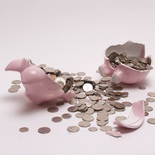
Five years in, a White House report has rekindled the debate: Did economic stimulus create millions of jobs and avert another Great Depression, or did it prolong the recession and delay recovery? Which of these opposite interpretations you find more convincing hinges, of course, on the counterfactual question of what you think would have happened if the US government had not spent that $787 billion. How do we decide what to think about such matters?
In the physical sciences, you can release an apple and watch it bonk someone on the head over and over again, to take one simple example, and conclude that apples are bad for your health. Someone else can then come along and explain to you why you are mistaken and draw the correct conclusions about gravitational attraction. It's all repeatable and verifiable and completely uncontroversial.
Not so with the social sciences. This is because we can't run repeated and controlled laboratory experiments on whole economies, for instance. The economic stimulus happened, and over the next five years the US economy did what it did, neither collapsing nor thriving. But while the one surely had some effect on the other, how much of an effect, and in which direction, is not at all obvious just from these bare facts. Teasing out the relevant causal signal from the noise of all other causes and effects is not simple and straightforward.
One thing that makes me doubt the administration's story is that wealth cannot be created by decree out of thin air. Each dollar spent by government is ultimately a dollar not spent or invested by taxpayers, whether it comes from direct taxation or from borrowing or currency inflation, which are indirect forms of taxation. Government stimulus, with all its attendant inefficiencies, crowds out private stimulus, which tends to be more efficient. Why does it tend to be more efficient? Well, whose money would you be more likely to spend prudently: yours or someone else's?
These are general theoretical principles, but the messy laboratory of history, such as it is, does provide some support for them. Contrary to popular belief, Hoover did not prolong the Great Depression by keeping his hands off the economy, and FDR did not spend the country back to prosperity. In contrast, Harding did take a laissez faire approach to the Panic of 1920, and it turned into The Depression That Wasn't. Conclusive proof? Maybe not, but pretty suggestive nonetheless.
Not so with the social sciences. This is because we can't run repeated and controlled laboratory experiments on whole economies, for instance. The economic stimulus happened, and over the next five years the US economy did what it did, neither collapsing nor thriving. But while the one surely had some effect on the other, how much of an effect, and in which direction, is not at all obvious just from these bare facts. Teasing out the relevant causal signal from the noise of all other causes and effects is not simple and straightforward.
One thing that makes me doubt the administration's story is that wealth cannot be created by decree out of thin air. Each dollar spent by government is ultimately a dollar not spent or invested by taxpayers, whether it comes from direct taxation or from borrowing or currency inflation, which are indirect forms of taxation. Government stimulus, with all its attendant inefficiencies, crowds out private stimulus, which tends to be more efficient. Why does it tend to be more efficient? Well, whose money would you be more likely to spend prudently: yours or someone else's?
These are general theoretical principles, but the messy laboratory of history, such as it is, does provide some support for them. Contrary to popular belief, Hoover did not prolong the Great Depression by keeping his hands off the economy, and FDR did not spend the country back to prosperity. In contrast, Harding did take a laissez faire approach to the Panic of 1920, and it turned into The Depression That Wasn't. Conclusive proof? Maybe not, but pretty suggestive nonetheless.